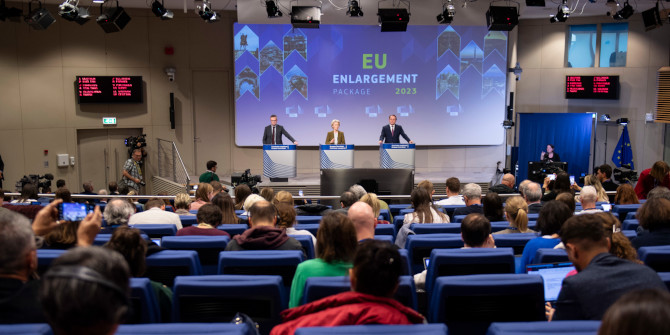 The Israel-Palestine conflict has persisted despite decades of talks and attempts at mediation from other regional and global powers. But what role can Europe play in the peace process? Drawing on a recent study, Anders Persson highlights that despite reservations from some scholars about Europe’s influence, the EU has significant normative power to shape the process, particularly in situations where both sides of the conflict actively seek international political support for their respective strategies.
The Israel-Palestine conflict has persisted despite decades of talks and attempts at mediation from other regional and global powers. But what role can Europe play in the peace process? Drawing on a recent study, Anders Persson highlights that despite reservations from some scholars about Europe’s influence, the EU has significant normative power to shape the process, particularly in situations where both sides of the conflict actively seek international political support for their respective strategies.
The conventional wisdom in the academic literature on EU–Israel/Palestine relations is that the EU has only displayed very limited, if any, normative power in the Israeli–Palestinian conflict. Originally developed by Ian Manners in 2002, the concept of ‘Normative Power Europe’ (NPE) is based on two parts. The first is the ability of the EU, according to Manners, ‘to define what passes as “normal” in world politics’. Secondly, the EU has, according to Manners, gradually developed a normative framework based on certain values that it tries to promote in its foreign policy. Manners identified five such core norms: peace, liberty, democracy, human rights and the rule of law. Previous studies have focused on the ability, or rather inability, of the EU to diffuse any of the NPE core norms into the Israeli–Palestinian conflict, while tending to ignore the ability of the EU to shape what is considered normal in many aspects of the conflict – either by making others adopt its policies, or by contributing to creating consensus around an issue.
In a new study, I argue that the EU has indeed significant normative justification at its disposal in some aspects of the conflict; that both the Israeli government and the Palestinian Authority (PA) have attached significant value to the EU’s normative power in some cases and that other third parties – from the U.S. government to local NGOs – have been influenced by the EU’s normative power. It is primarily in situations where Israel and the Palestinians actively seek or otherwise need international political support for their respective strategies that the ability of the EU to diffuse norms, set examples and shape what is seen as normal in world politics – in other words its normative power – becomes very important.
Defining what constitutes a just peace in the conflict
The first case study I put together looks at the EC/EU’s declaratory diplomacy on the need for a just peace in the conflict. In its first official statement on the conflict in 1971, the EC called for a just peace in the conflict without even mentioning ‘the Palestinians’ as part of the conflict. But after the 1973 war and the subsequent oil crisis, the EC became the leading international actor in promoting Palestinian claims as legitimate demands in the conflict.
At one point in 1980, in one of the earliest manifestations of the EC/EU’s ability to set an example and normalise its position in an important aspect of the conflict, Israeli Prime Minister Menachem Begin stated that there was nothing graver than Europe’s attempt to legitimise the PLO. Moreover, this particular example clearly shows the significant value that Israel attaches to the EU’s normative power. Indeed, there were many occasions over the past decades when the EC/EU has issued declarations that were adopted some years later in a similar way by other countries in the international community, most notably by the U.S., but also by Israel and some of the Arab states. This clearly suggests an underestimated role for the EU in influencing the attitudes and behaviours of others in the conflict.
The 2011 Palestinian bid for UN membership
The second case study I compiled is from 2010–11 when it became clear that the Palestinians were planning to seek recognition at the UN for a Palestinian state. Europe then quickly emerged as the crucial battlefield for whether the bid would succeed or not. Both the Israeli and Palestinian leaderships openly declared that they would measure the outcome by the stance adopted by the EU members.
An Israeli official told the International Crisis Group before the Palestinians were to submit their application to the UN that ‘Europe is vital because Europe is the key to international legitimacy. The US is the key to the effective exercise of power, but the US cannot confer legitimacy. The Europeans alone can do that.’ Never before in its soon five decades-long involvement in the Israeli–Palestinian conflict had the EU been in such a pivotal position. This was indeed Europe’s moment, a chance for the EU to really use its normative power as leverage in the conflict. But when the hesitant EU countries failed to back the Palestinian bid, Israel instead claimed it had achieved a ‘moral majority’ against the Palestinians, thereby openly acknowledging the EU’s normative power on this issue.
Can differentiation make any difference?
My third case study emerged in 2012-2013 when the EU embarked on a new strategy in the Israeli–Palestinian conflict, which is increasingly referred to as ‘the differentiation strategy’. Defined by the European Council on Foreign Relations (ECFR) as ‘a variety of measures taken by the EU and its member states to exclude settlement-linked entities and activities from bilateral relations with Israel’, the differentiation strategy provides a new and highly interesting case study for the EU’s normative power.
While the differentiation measures taken so far by the EU by no means have stopped Israel’s expansion of settlements, they have contributed to the non-recognition of them. Similar to the first case study, there is much evidence here to show that the EU has acted as an example and shaped the discourse on differentiation. A number of companies and institutions have divested from Israeli entities directly involved in the occupation in recent years. In 2016 and 2017 there was also a growing trend of what I call ‘grassroots differentiation’, where the PA, NGOs and other activists were involved in trying to get organisations like FIFA and companies like Airbnb, PayPal and Hewlett-Packard to suspend their activities with Israeli entities behind the Green Line.
The limits of normative power
The occupation of the Palestinian territories has now been in place for around half a century, and Israel’s hold over the territories is seemingly stronger than ever before. But so is the non-recognition of the occupation and the settlements. Not a single country in the world recognises that the West Bank is part of Israel. As my first case study illustrates, the EU has changed the discourse over a Palestinian state, but not the reality on the ground.
While this is a clear example of the EU’s normative power, it is perhaps an even clearer example of the limits of ‘pure’ normative power, which is entirely disconnected from material power. The differentiation strategy, including what I refer to as grassroots differentiation, will probably develop further, but a key question is to what extent future differentiation measures will focus on Israeli state entities involved in the settlements, as opposed to the mostly exclusive settlement focus it has had so far.
Please read our comments policy before commenting.
Note: This article draws on the author’s recent study in the Journal of Common Market Studies. The article gives the views of the author, not the position of EUROPP – European Politics and Policy or the London School of Economics.
_________________________________
 Anders Persson – University of Copenhagen / Lund University
Anders Persson – University of Copenhagen / Lund University
Anders Persson is a postdoc researcher at the Centre for European Politics at University of Copenhagen / Lund University – where he is conducting a research project funded by the Swedish Research Council on the EU’s normative power in the Israeli-Palestinian conflict. He has written three books about the Israeli-Palestinian conflict of which the latest is The EU and the Israeli-Palestinian conflict 1971-2013: In Pursuit of a Just Peace (Lanham, Lexington Books: 2015). He is an expert commentator on Swedish TV/radio/press on Israel-Palestine and also writes a blog for Huffington Post and contributes regularly to Haaretz, Politico EU and EU Observer.





I found it interesting that plans for a functioning Palestinian state that do not depend on foreign aid were conspicuously absent from this article.